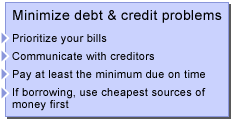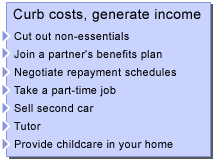NEW YORK (CNN/Money) -
With the labor market in its worst slump since World War II, those who are at risk of losing their jobs or who have already gotten a pink slip know all too well it can be a long haul before they get their next position.
Job growth has been stagnant, and average job search times have increased for seven consecutive quarters. In the first quarter of 2003, the median search time for a job surged to 4.2 months, a 17-year record high.
| JOBLESS IN AMERICA
|

|
|
|
|
Careful money-management during such difficult times can prevent a temporary problem from undermining your finances for years to come.
Three bill-paying strategies
There are three smart bill-paying strategies financial experts recommend after a layoff: prioritize your bills, keep an open line of communication with your creditors, and pay what you owe on time.
Your top priority should be to pay your basic living expenses in full: housing, car, food, utilities and health insurance. At the very top of your list should be your secured debt such as your house and your car - things a lender can repossess if you fail to meet your obligations, said Steve Rhode, president of MyVesta.org, an organization that offers advice on dealing with financial crises.

If you think you'll have trouble making any payments, talk to your creditors and try to work out a deal that is more manageable in the near term. Some housing and car lenders, for instance, may be willing to negotiate a skipped payment or reduced monthly payments for a fee. But, remember, you will owe the difference eventually, so don't agree to terms that you won't be able to afford later, Rhode said.
To renegotiate your payments successfully, you must demonstrate that you're realistic about your financial situation and job prospects, he said. And you need to pay what you owe on time every month. Otherwise, you risk a strike against your credit record and the wrath of your lender, whose good graces you may need again down the road.
It's less likely that you can negotiate a reduced payment schedule for your credit card. So be sure to pay at least the minimum due on every statement and mail your payment in on time.
Other ways to minimize financial pain
Securing money to pay your bills is easier when you minimize what you owe in the first place, regardless of whether you have severance or qualify for unemployment benefits, which in most states are capped at between $300 and $400 a week.
"First look at where the safety nets are in the household," said certified financial planner Peg Eddy of San Diego.
If you have a working spouse, find out what insurance policies and services you qualify for in his or her benefits plan. For instance, you're likely to pay significantly less for health insurance than if you continued the policy you had from your old job.
If you have teen-agers, let them know you'll all need to do some belt-tightening. That way, Eddy said, "they'll know the goody box is closed temporarily."
If you're carrying credit card balances, consolidate them onto a low interest rate card. But be sure that card doesn't impose a short time limit, after which your rate will skyrocket.
Borrow if you must
If you don't have savings and you're running out of money, pick the cheapest sources for loans. This is not the time to live off your credit card if you can help it.
A home equity line of credit is one low-cost option if you own your home and if you have a working spouse, since that improves your chances of being approved, Eddy said. Taking the cash value of a life insurance policy is another option. In both cases, the rates are lower than what you'd pay on a credit card. And with a cash value policy, she said, you never have to pay it back; the amount you take just reduces the death benefit paid to your beneficiaries.
You also could ask a friend or family member for a loan, but if you do, formalize your agreement on paper to prevent any misunderstandings or hard feelings, said Carrie Cole, a certified financial planner in Dearborn, Mich.
Whatever you do, "don't drain your assets," Rhode said. Cashing out of a 401(k) - which is protected from creditors -- just to cover a few months of expenses means you'll soon be hard-pressed for cash again and you'll no longer have a retirement nest egg.
And you'll owe 20 percent in taxes and a 10 percent penalty on your withdrawal if you're under age 59-1/2. Tapping retirement funds should be a last bastion for a true five-alarm emergency, such as the threat of foreclosure on your house, Eddy said.
Don't overlook the obvious
Of course, the best way to ease your bill-paying concerns is to generate income, even if it isn't from a full-time job. "There's a lot that can be done that people don't think of," Eddy said.

Part-time work tops the list. "Try to find any kind of work before tapping those credit card cash-advances," Cole said. You might also tutor, baby-sit, clean houses, write freelance, or help a small business set up its Web site.
You also could sell your second car or have a garage sale. (For more tips on how to live cheaply without skimping on pleasure, click here.)
Whatever you choose, keep this in mind: You're not alone, you're not what you earn, and when you make efforts to keep your financial life in order, you're doing yourself and your family a financial favor.
(This article, last published in March, has been updated.)

|

